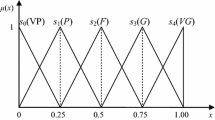Abstract
With respect to the multiple attribute decision making problems in which the attribute values take the form of the 2-dimension uncertain linguistic information, a new method based on the generalized hybrid operators is proposed. Firstly, the definition, properties, expectations and ranking method of 2-dimension uncertain linguistic information are introduced, and the operational laws the 2-dimension uncertain linguistic information are defined. Then some aggregation operators, including 2-dimension uncertain linguistic generalized weighted average operator, 2-dimension uncertain linguistic generalized ordered weighted average operator, and 2-dimension uncertain linguistic generalized hybrid weighted average operator, are developed, and some properties and special cases of them are also discussed. Finally, these operators are applied to multi-criteria decision making and an illustrative example is given to verify the developed approach and to demonstrate its effectiveness.

Similar content being viewed by others
References
Churchman CW, Ackoff RL, Arnoff EL (1975) Introduction to operations research. Wiley, New York
Herrera F, Herrera-Viedma E, Chiclana F (2001) Multiperson decision-making based on multiplicative preference relations. Eur J Oper Res 129:372–385
Herrera F, Martínez L (2000) A 2-tuple fuzzy linguistic representation model for computing with words. IEEE Trans Fuzzy Syst 8(6):746–752
Herrera F, Verdegay JL (1993) Linguistic assessments in group decision. In: Proceedings of the 1st European Congress on fuzzy and intelligent technologies, Aachen, pp 941–948
Liang XC, Chen SF (2008) Multiple attribute decision making method based on trapezoid fuzzy linguistic variables. J Southeast Univ 124(4):478–481 English Edition
Liu PD (2013a) The multi-attribute group decision making method based on the interval grey linguistic variables weighted aggregation operator. Journal Intell Fuzzy Syst 24(2):405–414
Liu PD (2013b) Some generalized dependent aggregation operators with intuitionistic linguistic numbers and their application to group decision making. J Comput Syst Sci 79(1):131–143
Liu PD (2014) Some Hamacher aggregation operators based on the interval-valued intuitionistic fuzzy numbers and their application to group decision making. IEEE Trans Fuzzy Syst 22(1):83–97
Liu PD, Jin F (2012) Methods for aggregating intuitionistic uncertain linguistic variables and their application to group decision making. Inf Sci 205:58–71
Liu PD, Liu ZM, Zhang X (2014) Some intuitionistic uncertain linguistic heronian mean operators and their application to group decision making. Appl Mathe Comput 230:570–586
Liu PD, Su Y (2010) The multiple-attribute decision making method based on the TFLHOWA operator. Comput Math Appl 60(9):2609–2615
Liu PD, Wang YM (2014a) Multiple attribute group decision making methods based on intuitionistic linguistic power generalized aggregation operators. Appl Soft Comput 17:90–104
Liu PD, Wang YM (2014b) Multiple attribute decision making method based on single valued neutrosophic normalized weighted bonferroni mean. Neural Comput Appl 25(7–8):2001–2010
Liu PD, Yu XC (2014) 2-Dimension uncertain linguistic power generalized weighted aggregation operator and its application for multiple attribute group decision making. Knowledge-Based Syst 57(1):69–80
Liu PD, Zhang X (2012) An Approach to Group Decision Making Based on 2-dimension Uncertain Linguistic Assessment Information. Technol Econ Dev Econ 18(3):424–437
Wang X, Chen HY, Liu X (2011) Multiple attribute group decision making with interval two-tuple linguistic information based on deviation. Chin J Manag 8(2):301–305
Wang Y, Xu ZS (2008) A new method of giving OWA weights. Math Pract Theory 38(3):51–61
Wei GW, Huang DS, Wei Y (2007) ULHGA operator and its application to group decision making under uncertain linguistic environment. Fuzzy Syst Math 21(2):72–78
Xu ZS (2004a) Uncertain linguistic aggregation operators based approach to multiple attribute group decision making under uncertain linguistic environment. Inf Sci 168(1–4):171–184
Xu ZS (2004b) Uncertain multiple attribute decision making methods and application. Tsinghua University Press, Beijing
Xu ZS (2006) Induced uncertain linguistic OWA operators applied to group decision making. Inf Fusion 7(2):231–238
Xu ZS (2007) Group decision making with triangular fuzzy linguistic variables. Intell Data Eng Autom Learn-IDEAL 4881:17–26
Yager RR (1988) On ordered weighted averaging aggregation operators in multicriteria decision making. IEEE Trans Sys Man Cybern 18(1):183–190
Yager RR (2004) Generalized OWA aggregation operators. Fuzzy Optim Decis Mak 3:93–107
Yu XH, Xu ZS, Liu SS, Chen Q (2012) Multi-criteria decision making with 2-dimension linguistic aggregation techniques. Int J Intell Syst 27(6):539–562
Zadeh LA (1975a) The concept of a linguistic variable and its application to approximate reasoning - I. Inf Sci 8(3):199–249
Zadeh LA (1975b) The concept of a linguistic variable and its application to approximate reasoning - II. Inf Sci 8(4):301–357
Zadeh LA (1975c) The concept of a linguistic variable and its application to approximate reasoning - III. Inf Sci 9(1):43–80
Zhang C, Zhou GZ, Zhu WD (2011) Research on peer review system for the national science foundation based on two-dimensional semantics evidence reasoning. China Soft Sci 2:176–182
Zhou LG, Chen HY (2012) A generalization of the power aggregation operators for linguistic environment and its application in group decision making. Knowl-Based Syst 26:216–224
Zhu WD, Zhou GZ, Yang SL (2009) An approach to group decision making based on 2-dimension linguistic assessment information. Syst Eng 27(2):113–118
Acknowledgments
This paper is supported by the National Natural Science Foundation of China (Nos. 71271124, 71471172), the national soft science research project (2014GXQ4D192), the Natural Science Foundation of Shandong Province (No. ZR2011FM036), Shandong Provincial Social Science Planning Project (No.13BGLJ10), and Graduate education innovation projects in Shandong Province (SDYY12065).
Author information
Authors and Affiliations
Corresponding author
Rights and permissions
About this article
Cite this article
Liu, P., He, L. & Yu, X. Generalized Hybrid Aggregation Operators Based on the 2-Dimension Uncertain Linguistic Information for Multiple Attribute Group Decision Making. Group Decis Negot 25, 103–126 (2016). https://doi.org/10.1007/s10726-015-9434-x
Published:
Issue Date:
DOI: https://doi.org/10.1007/s10726-015-9434-x



